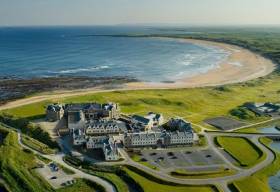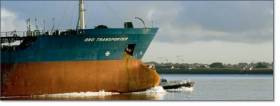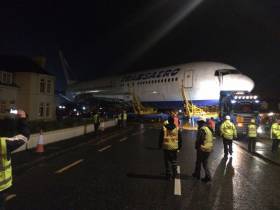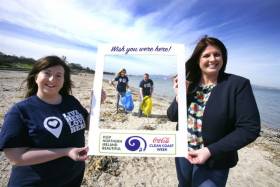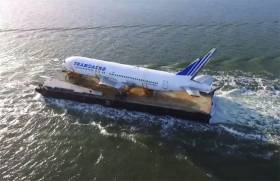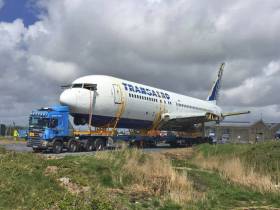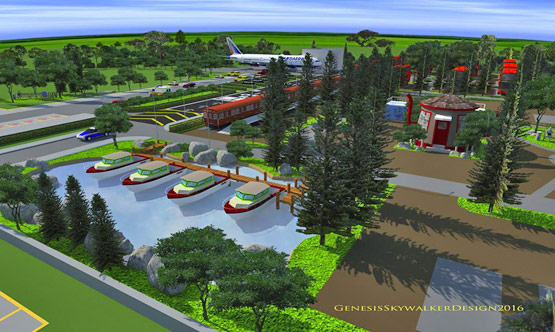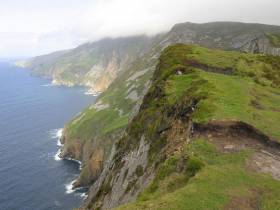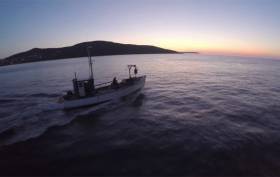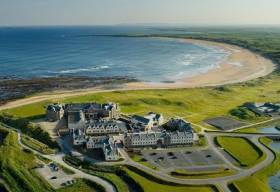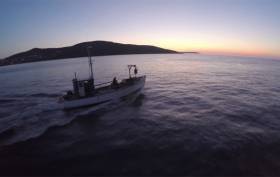Displaying items by tag: Coastal Notes
Doonbeg Backs Coastal Defences At Trump Golf Resort
#Doonbeg - Doonbeg businesses and residents have come out in almost unanimous support for coastal defence works at Donald Trump's golf resort in the Co Clare village.
Two months ago the billionaire businessman and US presidential hopeful was stumped in efforts to bypass Clare County Council with plans for a 200,000-tonne, 2.8km rock wall to prevent coastal erosion alongside the links course he purchased in February 2014.
But as The Irish Times reports, Doonbeg says 'Yes' – as all but one of the local submissions to the council over the scheme give their backing to the embankment, which it's claimed would also protect local homeowners and farms from flooding.
Thirty-six of the 112 total submissions are opposed to the project. These include the Save Doughmore Beach Protection Group, a new association formed in the community north of Doonbeg, who say the rock wall will have a "negative effect for countless generations".
The Irish Times has more on the story HERE.
#FuelPipeline - A controversial €20m aviation fuel pipeline proposed by a developer, planned to stretch from Dublin Port to Dublin Airport, must indemnify Dublin City Council against any environmental damage caused by accidents on the line.
The Herald writes that this was one of 33 conditions laid down by An Bord Pleanala in granting planning permission for the 14km project.
Residents living along the route of the proposed line had raised concerns over its safety and possible environmental impact.
The pipeline runs through Dublin City Council and Fingal County Council territory. Both councils granted permission for it to go ahead last year.
While the Fingal decision wasn’t appealed to An Bord Pleanala, appeals were lodged against the decision of Dublin City Council by residents.
For more on the story, click here.
#PlaneSailing - The Boeing 767 that wowed Ireland as it sailed by barge from the Shannon Estuary to a Sligo coastal town arrived at its new home, according to RTÉ News.
Preparations were being made last night (Saturday 7 May) to move the aircraft fuselage from its barge to the nearby site of Enniscrone entrepreneur David McGowan's ambitious Quirky Nights Glamping Village – where it will be converted into unique accommodation alongside converted buses, boats and black cabs.
As previously reported on Afloat.ie, the aircraft set sail from Shannon on Thursday on the barge after being lifted from the airport grounds earlier in the week using a specially commissioned cradle.
Today FM's Anton Savage Show, which has regaled listeners with McGowan's 'plane sailing' adventures over recent weeks, even broadcast from Enniscrone hours before the Boeing's arrival to mark the event.
Downtown Enniscrone of an average Saturday night.#PlaneSailing pic.twitter.com/HXbYjF3kSC
— TheAntonSavageShow (@AntonSavageShow) May 8, 2016
Ireland’s Largest Coastal Clean-Up Returns This Week
#CleanCoasts - Almost 3,000 volunteers took to beaches around the country during Coca-Cola Clean Coasts Week 2015 to remove a staggering 10 tonnes of marine litter from the coastline.
With a target to remove a further 11 tonnes from beaches around the island of Ireland this year, Coca-Cola Clean Coast Week 2016 – which kicked off yesterday (Friday 6 May) and runs till next Sunday 15 May – is calling on volunteers across the island to once again get involved in the numerous coastal clean-ups and events taking place throughout the week.
Over 120 beach cleans are planned alongside more than 20 coastal celebration events across Ireland in celebration of the beautiful natural resource of the coastline and to raise awareness of the importance of keeping beaches clean from litter.
With the theme ‘Enjoy Your Beach, Enjoy Your Beach Clean’, the 2016 awareness week is run by the Environmental Education Unit of An Taisce in partnership with Coca-Cola and Keep Northern Ireland Beautiful.
The week sees range of fun and informative events with the aim of raising awareness of the importance of protecting our coastline. Coastal celebrations range from beach fitness activities that incorporate clean-ups, to a seal release in partnership with Seal Rescue Ireland at Curracloe Strand in Wexford, and talks on the role of marram grass planting in halting coastal erosion.
Other events include National #2MinuteBeachClean Day, the launch of Love Your Coast photography competition, and Beat the Microbead Day.
While all events throughout Coca-Cola Clean Coast Week 2016 are free, some are ticketed – visit www.cleancoasts.org for all the details.
#PlaneSailing - Video has emerged of the Boeing 767 being sailed by barge from the Shannon Estuary up the coast to Enniscrone for its new life as part of a 'glamping' site in the Co Sligo seaside town.
Local funeral director and entrepreneur David McGowan has kept listeners to Today FM's Anton Savage Show updated on his plans to make the decommissioned plane – nicknamed 'The Big Yoke' – the centrepiece of his Quirky Nights Glamping Village concept.
As previously reported on Afloat.ie, McGowan hopes for the aircraft to arrive in Enniscrone by tomorrow (Saturday 7 May).
And what's more, The Anton Savage Show will broadcast live on location from 11am on Today FM to celebrate its arrival - follow the hashtag #PlaneSailing on Twitter for live updates.
Said Savage of the incredible story: “First we thought David was funny. Then we thought he was crazy. Now we’re sure he’s a genius.
"Any man whose business plan is a plane, train and a teapot in a field is our kind of guy. It’s an honour to be there to see the Big Yoke land.”
#PlaneSailing - A funeral director's ambitious plans for a unique 'glamping' site in Enniscrone will move a step closer to fruition later this week as he prepares to sail a passenger jet by barge up the coast from Shannon.
That's right, a passenger jet – a Boeing 767 to be precise, which David McGowan picked up for a song from a liquidating Russian airline, as the Irish Examiner reports.
McGowan is the entrepreneur behind the planned 'Quirky Nights Glamping Village' in his Co Sligo seaside town, where the former airliner will be the centrepiece of a development that will also feature repurposed train carriages, dry-docked boats London black cabs.
All will be refitted to accommodate a new kind of camper inspired by boutique festivals like Electric Picnic, people seeking the beauty of the outdoors and the comforts of hotels with a twist.
"I’m surrounded with death every week," McGowan told Today FM's Anton Savage Show of what prompted his imaginative idea to boost his coastal community's economy. "You need something to give you a buzz. You need to out and do something unusual.”
But getting the plane from Shannon Airport to Enniscrone posed a problem, as it's simply too big to transport by traditional means.
Hence the need for a barge to sail it by sea along the Wild Atlantic Way, and a specially engineered 'cradle' to lift it onto the barge.
That didn't come cheap – more than double what McGowan paid for the aircraft itself – but it did the job, and the plane is now ready at Knockbeg Point waiting for the weather to clear before the barge sets off this Thursday, expected in Enniscrone on Saturday 7 May.
A previous version of this article incorrectly attributed Independent.ie as the source of quotes from The Anton Savage Show on Today FM.
Donegal Is 'Hidden Paradise' For Adventurers
#Donegal - The coastline of Co Donegal is as much an attraction for adventure tourists as it is for those drawn to its rugged beauty, according to Outside magazine.
And some of those seeking thrills have even made the north-east county their home – such as Scottish-born climbing guide Iain Miller, who leads the magazine's Stephanie Pearson to breathtaking heights at once startlingly remote and surprisingly accessible.
But it's not just about climbers seeking the challenge of Donegal's sea stacks, nor the big swells that bring top surfers to the county in ever increasing numbers.
Sea kayakers, too, have coastal nooks and crannies to explore when the weather permits, while hikers have miles of the Irish portion of the International Appalachian Trail – which crosses one of Europe's highest sea cliffs in Slieve League.
Outside has much more on the story HERE.
'Atlantic' Director Talks Impact Of Economic & Ecological Change On Coastal Communities
#Documentary - "It’s about understanding the ocean, working with the ocean. Not just seeing it as something to grab, but as something you look after."
That's the message of new documentary Atlantic by Irish filmmaker Risteard Ó Domhnaill, who spoke to Ian Maleney for The Irish Times on its release in Irish cinemas yesterday (Friday 29 April).
As previously reported on Afloat.ie, the feature-length documentary – narrated by Emmy Award-winner Brendan Gleeson – follows the fortunes of three small Atlantic coastal fishing communities in Ireland, Canada and Norway.
Each facing their own challenges, from the impact of oil exploration and climate change to the pressures of large-scale commercial fishing.
And as Ó Domhnaill relates from his experience making the film, these livelihoods have changed dramatically even in only the last five years.
"Who knows what’s going to happen, what’s going to hit the ocean?" he says of the years ahead. "Acidification, warming of currents? We’re facing a crossroads. We can’t just fence off our part of the sea and say ‘We’ll look after that’. It’s a much bigger challenge."
The Irish Times has much more on the story HERE.
Planners Stump Trump Over Doonbeg Coastal Defences
#Doonbeg - Donald Trump may be topping Republican Party polls on the road to The White House, but the billionaire businessman has hit a stumbling block in proposals for his Doonbeg golf resort, as The Irish Times reports.
An Bord Pleanála has ruled that plans for a 200,000-tonne, 2.8km coastal embankment adjacent to the links course Trump purchased in February 2014 do not constitute a 'strategic infrastructure development', or SID, which would have allowed the scheme to bypass Clare County Council.
Now the plans – declared as protection against coastal erosion – must be resubmitted to the council for a decision whose outcome "will determine the future of our business, the local community and its citizens", according to the resort's general manager Joe Russell.
The application is expected to face opposition from environmentalists mindful of the area's protected species such as the narrow-mouth whorl snail, a tiny mollusc at the centre of controversy over unauthorised coastal defence works on the shoreline two years ago.
The Irish Times has more on the story HERE.
#Documentary - A new documentary from the maker of The Pipe takes on the powerful interests "carving up" Ireland's ocean resources.
Opening in Ireland on 29 April, Risteard Ó Domhnaill's Atlantic is narrated by Emmy Award-winner Brendan Gleeson, and was awarded the Best Irish Documentary prize at the recent Audi Dublin International Film Festival.
Shot across Ireland, Norway and Newfoundland in Canada by Scannáin Inbhear/Inver Films, Atlantic expands upon the controversial subject matter of his previous film – the experiences of Rossport residents opposed to Shell's prospect in the Corrib gas field – to tell a wider story of threats to coastal communities not only in Ireland, but around the North Atlantic Rim.
Atlantic follows the fortunes of three small fishing communities as they struggle to maintain their way of life in the face of mounting economic and ecological challenges.
'Atlantic' - the race for the resources of the North Atlantic from Risteard O Domhnaill on Vimeo.
As the oil majors drive deeper into their fragile seas, and the world’s largest fishing companies push fish stocks to the brink, coastal people and the species they rely on may be reaching a point of no return.
In Norway, fishermen and their resource have historically been aggressively protected by national authorities. But as oil fields dwindle and the country now looks to add to its reserves, Arctic cod fisherman Bjornar Nicolaisen is campaigning against seismic testing by the oil explorers criss-crossing his fishing grounds.
On the outer edges of Norway’s five-star economy, seismic blasting is threatening to blow Bjornar’s livelihood out of the water.
Across the ocean in Newfoundland, where an oil boom has hit, fisherman Charlie Kane will likely be the last of his generation to work the sea, after a cod fishing ban in the 1990s brought a world-renowned industry to a halt overnight.
Charlie is thankful his sons can now make a good living on the oil rigs, and won’t need to toil in small boats on Newfoundland’s perilous Grand Banks. But now, as oil prices plummet, their village is once more taking on water, as the the quick money of the black gold rush begins to run dry.
Meanwhile, in the West of Ireland, Jerry Early has seen the heart ripped out of his island after a ban on drift netting for wild salmon. As he fights to regain his fishing rights, and as foreign super-trawlers operate with impunity just offshore, Jerry feels like a criminal on his own boat.
The circumstances could be dire if he defies the 'new order of the ocean', but as the unofficial 'mayor' of a dying island, Jerry feels he has to face up to powerful interests before it’s too late.
Filmed in some of the most remote and breathtaking locations in the North Atlantic, and at close quarters with some of the sea’s most captivating characters, Atlantic brings the very personal stories in the vital resource debate to the fore, exploring how three modern-day communities must learn from the past in order to secure a brighter future.
Risteard O’Domhnaill said of his new film: “My last documentary, The Pipe, told the story of a small coastal community as they faced down one of the world’s most powerful oil companies, which was forcing a high-pressure raw gas pipeline through their farms and fishing grounds.
"The story raised more questions for me than it answered, leading me to look at the politics of our oil and gas prospects off the Irish coast. What has since unfolded is an incredible story of resource mismanagement, and the capture of our offshore riches — oil, gas and fishing — whilst our gaze is elsewhere.
“Unfortunately, what I found when I looked across the Atlantic is that Ireland’s tale is not unique. However, in both Norway and Newfoundland, the lessons learned by similarly affected communities can help us to chart a different course, before our most renewable resources are damaged beyond recognition, or sold to the highest bidders.”
Commenting on his involvement, Brendan Gleeson said: “Atlantic is an engrossing piece of truth-seeking, visually stunning and crafted with clarity and insight. It was an honour to be involved.”
As previously reported on Afloat.ie, Atlantic started as an ambitious crowdfunding project, but is now backed by Bord Scannán na hÉireann (The Irish Film Board), the Canadian Broadcasting Corporation, the Newfoundland and Labrador Film Development Corporation and Nordnorsk Filmsenter (the North Norwegian Film Centre).
The feature-length documentary opens in Dublin exclusively at the Irish Film Institute on Friday 29 April, with director Risteard O’Domhnaill joined by Arranmore and Rossaveal shermen for a discussion following the 8.30pm screening on the first night. For more see the official film website HERE.



























